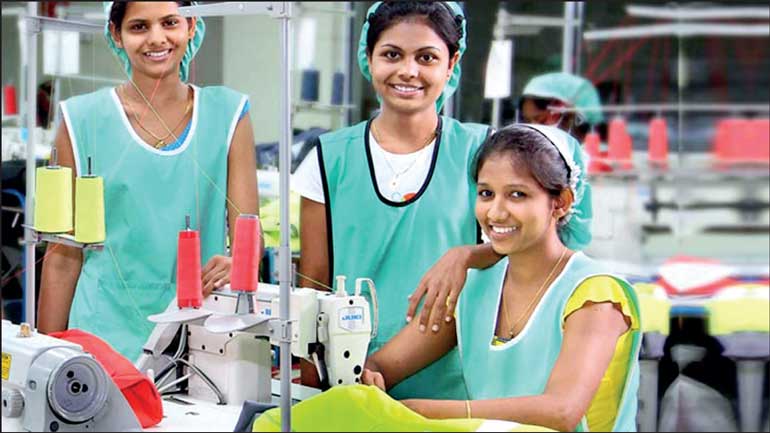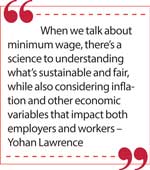Thursday Feb 19, 2026
Thursday Feb 19, 2026
Wednesday, 19 February 2025 00:02 - - {{hitsCtrl.values.hits}}

The Sri Lankan apparel industry has set itself apart by offering wages that exceed the minimum wage standard
By Kushlani Nagahawatta
 |
| JAAFSL Secretary General Yohan Lawrence
|
With global conversations on worker welfare intensifying, the debate over minimum wage in Sri Lanka has become increasingly pressing, especially within key sectors like apparel. While the minimum wage is fundamentally a benchmark of societal values, determining this wage requires a careful balance of social responsibility and economic sustainability. In Sri Lanka’s apparel industry, there is already a strong precedent: workers are consistently paid above the statutory minimum wage, reflecting the sector’s commitment to fair compensation. However, leaders like Yohan Lawrence, Secretary General of the Joint Apparel Association Forum of Sri Lanka (JAAFSL), emphasise that minimum wage policies must be based on economic science rather than the whims of policy-makers to ensure long-term stability.
An industry leading by example
The Sri Lankan apparel industry has set itself apart by offering wages that exceed the minimum wage standard. All apparel companies, even SMEs adhere to this, with major apparel companies routinely paying workers up to double the legal minimum, reinforcing the sector’s commitment to fair compensation. “Apparel companies in Sri Lanka aren’t just meeting wage standards; they’re creating benchmarks for others in the region,” Lawrence states. For these companies, exceeding the minimum wage is more than a legal compliance measure—it reflects the respect they have for each worker. “For us, every person in the company matters. Every stitch matters. That’s why we make sure our employees earn above the minimum wage,” Lawrence affirmed.
“Our goal has always been to offer competitive wages that support our workforce, not just to meet legal requirements but to ensure we retain talent and uphold our industry’s reputation,” Lawrence says. By prioritising competitive pay, the industry not only supports its workforce but also strengthens Sri Lanka’s position in the global apparel market. Lawrence describes the industry’s wage policies as part of a broader commitment to creating a sustainable and responsible business model that benefits all stakeholders.
The apparel sector, like many other manufacturing industries, has a wage structure that combines a fixed monthly wage with a number of variable incentive payments, including production bonus and attendance allowances that are paid regularly as part and parcel of the monthly paycheck. In Sri Lanka, the National Minimum Wage requirement is applicable only in respect of the fixed monthly wage. The other cash benefits that form part of the employees’ earnings are therefore over and above the fixed wage. This is not a new concept but has been in place globally for all manufacturing. It is therefore a fallacy to take a position that employees will “only” earn a fixed wage that by law has to meet the legal minimum wage of the country.
Beyond the paycheck: Benefits that support a living wage
 In addition to competitive wages, many Sri Lankan apparel companies offer benefits that further enhance the well-being of employees. Health insurance, subsidised meals, transport, and on-site childcare facilities are common, with additional programs like educational support for employees’ children, and wellness programs frequently provided. This package of non-cash benefits helps employees meet their essential needs reducing reliance on wages alone.
In addition to competitive wages, many Sri Lankan apparel companies offer benefits that further enhance the well-being of employees. Health insurance, subsidised meals, transport, and on-site childcare facilities are common, with additional programs like educational support for employees’ children, and wellness programs frequently provided. This package of non-cash benefits helps employees meet their essential needs reducing reliance on wages alone.
“There’s a commitment here to ensuring that wages reflect the industry’s standards of care,” says Lawrence. These additional support systems aim to provide workers with a quality of life that goes beyond the paycheck, contributing to a holistic approach to worker welfare. This commitment demonstrates how ethical labor practices not only uplift individual workers but also foster a resilient industry reputation and loyalty among employees.
Moving beyond the minimum: Why wage policies should be data-driven
While the industry’s practices are commendable, Lawrence warns against using emotion as the primary basis for determining wage policies. The apparel sector is responsible for a substantial portion of Sri Lanka’s exports and employment, so any arbitrary adjustments to wage structures could disrupt this balance. “The industry sustains jobs, supports communities, and plays a large role in the Sri Lankan economy,” Lawrence explains. “If we adjust wages without considering economic indicators and data, we risk unintended consequences that can harm the very people we intend to support.”
Lawrence calls for a data-driven approach that relies on economic indicators, including inflation, living costs, and productivity levels. Setting the minimum wage with these factors in mind allows for adjustments that are realistic and sustainable, benefiting both workers and employers. “When we talk about minimum wage, there’s a science to understanding what’s sustainable and fair, while also considering inflation and other economic variables that impact both employers and workers,” he adds. By following this methodology, the Sri Lankan apparel industry can maintain its commitment to fair wages while preserving its economic stability.
Investors want predictability, and the factors considered when setting a minimum wage needs to be agreed in advance by all stakeholders, together with the calendar for revision. That way businesses can plan and budget these increases in advance, rather than be faced with random increases based purely on subjective factors. In defining a minimum wage, it is important to be specific about which components of a wage can be counted in the minimum, the extent and conditions under which payment in-kind can be allowed, how the minimum is calculated for workers with piece rate pay. The International Labour Organization has published guidelines in this regard.
Towards a living wage: A long-term vision
While the minimum wage ensures a basic income level, the concept of a living wage (or a fair wage)—income sufficient for employees to meet their essential needs and achieve a modest standard of living—is gaining global attention. Lawrence supports this idea but underscores that the path to implementing a living wage should be gradual and based on scientific analysis.
“A living wage is a concept that could benefit our workforce, but we need to understand its economic impact before making promises,” Lawrence notes. Sri Lanka’s fragile economic stability necessitates a cautious approach to the living wage, which, if implemented without rigorous analysis, could strain both businesses and the broader economy. Lawrence suggests exploring incremental wage increases, studying their impact on business operations, and finding ways to improve productivity to offset costs.
This careful, phased approach keeps the apparel industry abreast and ahead of international labour standards while supporting employee welfare responsibly. “Implementing a living wage is a complex task. It’s about finding a balance between supporting workers and ensuring the industry remains competitive in the long run,” he explains. By considering the long-term economic impact, Sri Lanka’s apparel sector can uphold its social responsibility without jeopardising its global competitiveness.
The conversation around minimum wage reform in Sri Lanka’s apparel industry reveals the importance of a balanced, scientific approach. For Lawrence and JAAFSL, the answer lies in prioritising science over emotion, ensuring that wage standards are beneficial for workers and sustainable for businesses. “We’re here to support the growth of our workforce and to set an example. But we must also ensure that the policies we adopt will enable long-term prosperity, not just quick fixes,” Lawrence remarks.
The Sri Lankan apparel industry’s commitment to paying above the minimum wage underscores its role as a leader in ethical labour practices. By integrating science-based approaches to wage policy, the industry ensures that worker welfare remains a priority without compromising its economic health.